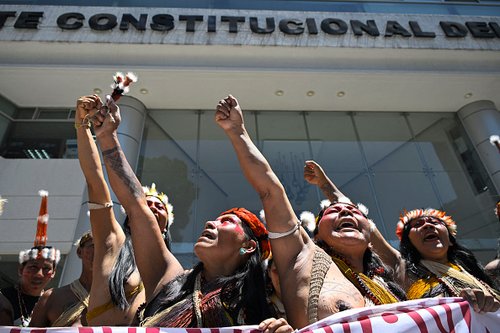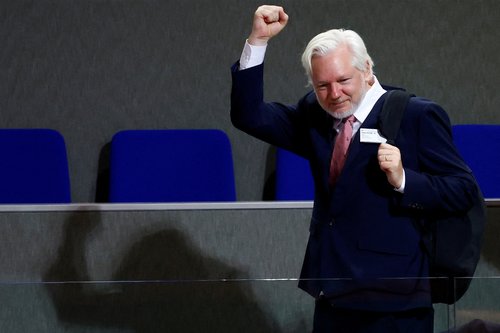Bright Spots
Across the globe, even in the face of repression, civil society continues to show remarkable resilience, achieving significant victories and progress in securing civic freedoms. The victories span from countries with the most repressed civic space conditions – showing the crucial role of civil society even in harsh environments – to those that broadly respect civic freedoms. Pressure from civil society has resulted in oppressive bills being withdrawn, historical and decades-long injustices being addressed and unjust detention and court rulings being overturned.
Civil society victories
Civil society movements have played a crucial role in advocating for human rights and advancing policies that support excluded groups. In LGBTQI+ rights, two major legal milestones stand out. In February 2024, Greece became the first Christian Orthodox country to recognise same-sex marriage and also grant adoption rights to same-sex couples, marking a historic step forward. Thailand then broke new ground in May 2024 by passing a marriage equality bill, making it the first Southeast Asian country to recognise same-sex marriage. Both had been the subject of extensive civil society advocacy.
Women’s rights advocacy also achieved critical breakthroughs. In the Czech Republic, civil society efforts led to a landmark reform in rape laws, with any non-consensual sexual act now classified as rape, removing the need for proof of force and strengthening protections for victims. In Kazakhstan, in response to advocacy around a high-profile murder trial, lawmakers swiftly introduced new legislation that re-established criminal penalties for battery and enhanced protections for domestic violence survivors. In Poland, the government passed a bill in February 2024 to make emergency contraception accessible without a prescription, reversing a restrictive 2017 law and marking a significant advance for reproductive rights.
The push for environmental justice also brought some significant advances in the past year. In the UK, judicial rulings underscored the necessity of environmental impact assessments for all development projects, strengthening community influence over decisions with potential environmental repercussions. In Australia in December 2023, the Supreme Court of New South Wales repealed several anti-protest laws specifically aimed at climate activists, marking a significant victory for environmental advocacy.
Progress was made for Indigenous rights in South America. In Ecuador, Indigenous communities succeeded in reclaiming control over ancestral lands after prolonged legal battles. In Peru, a March 2024 court ruling granted Indigenous women access to local rivers, reinforcing their cultural and environmental rights.
Several countries made strides in safeguarding freedom of expression. In Malawi, a new data protection law marks a vital step in safeguarding personal privacy against growing surveillance threats. Meanwhile, St Kitts and Nevis introduced whistleblower protections, strengthening the rights of people reporting corruption or misconduct.

Positive developments
Efforts to address past injustices have seen positive shifts in several countries, particularly in the release of unjustly detained people and accountability for perpetrators of past abuses. In Bahrain, over 1,500 political prisoners were released following royal pardons. In January 2024, Virginia Laparra, a former prosecutor for Guatemala’s Special Prosecutor’s Office Against Impunity, known for leading key anti-corruption investigations, was released after almost two years in detention. However, she then left the country to safeguard her life and freedom amid rising threats. In Brazil, two former military police officers were sentenced for the 2018 murder of councillor Marielle Franco, revealing connections between Rio de Janeiro’s political elite and local paramilitary groups formed by retired and active police officers.
In response to sustained pressure from civil society, authorities in some countries have begun to address past abuses against press freedom, resulting in corrective actions in several high-profile cases. In the UK, Julian Assange of WikiLeaks was released in July 2024 after five years in detention. In Yemen, journalist Al-Azazi was freed in February 2024 following persistent appeals from civil society groups, after enduring four months of solitary confinement under poor conditions. In India, the Supreme Court ordered the release of NewsClick founder Prabir Purkayastha in May 2024 after 225 days in detention, which was part of a broader police crackdown on journalists connected to the outlet. Iran’s judiciary also reversed prison sentences of over 10 years for two women journalists.
Further legal successes included rulings in favour of Indigenous communities and environmental defenders. In Mexico in May 2024, a judge overturned a 46-year sentence imposed on David Hernández Salazar, a land defender, while also dismissing charges against 17 members of the Binniza Indigenous community. In March 2024, Indonesia’s Supreme Court upheld the acquittals of environmental defenders Haris Azhar and Fatia Maulidiyanti. In February 2024, the Cambodian Supreme Court overturned convictions against Boeung Kak Lake Community land activists.

There were some developments in delivering justice in cases of accountability for past abuses, although much more needs to be done. In December 2023, Suriname’s High Court upheld former President Desi Bouterse’s conviction for the 1982 'December Murders’, which involved extrajudicial killings of political opponents. In the Netherlands, two police officers faced prosecution for using excessive force during a 2021 COVID-19 protest. In Peru, the Superior Court of Justice in Ucayali sentenced four people to over 28 years each in jail in April 2024 for the 2014 murders of Ashéninka Indigenous leaders who had fought for land rights.